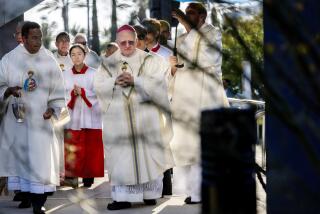LATIN AMERICA : Brazilian TV Show Pits Evangelicals Against Catholics
- Share via
RIO DE JANEIRO — A greedy, corrupt and lascivious preacher in a popular miniseries on Brazilian television bears a strong resemblance to Bishop Edir Macedo, the country’s most famous evangelist. Macedo’s followers are furious.
The miniseries has been airing weeknights on TV Globo, the network that dominates Brazilian television. Now, a smaller network, owned by Macedo’s Universal Church of the Kingdom of God, is on the counterattack.
Analysts say the clash is evidence of a power struggle between a media giant that represents Brazil’s Establishment, traditionally Roman Catholic, and a rising socio-religious force that is challenging tradition. In recent decades, the growth of evangelical Protestant churches has chipped away at the Catholic Church’s predominance in Brazil, and Macedo’s church has become especially aggressive in asserting its social and political strength.
In the Globo miniseries, titled “Decadence,” an evangelist named Mariel Batista is portrayed as a seducer and blackmailer who lives a life of luxury by exploiting his followers for money. Globo insists that “Decadence” is strictly fiction, but Batista’s physical appearance and mannerisms closely resemble those of Macedo. And some of Batista’s lines echo Macedo’s comments during a 1990 magazine interview.
Long before the miniseries, Macedo was embroiled in controversy. He has been accused of staging fake faith healings and of extracting money from members, and he was detained for 12 days in 1992 on charges of fraud and illicit enrichment. One court found him innocent; an appeal by the Sao Paulo state prosecutor’s office is pending.
“He uses manipulative methods to get money,” contends the Rev. Caio Fabio D’Araujo Jr., president of the Brazilian Evangelical Assn.
D’Araujo said Macedo’s church, which does not belong to the association, takes in at least $500 million a year in tithes and other donations.
Founded in 1977 and built largely on Macedo’s charisma and organizational skill, the church claims 3 million members in Brazil and has branches elsewhere in Latin America and in the United States, Europe and Africa.
Macedo, 50, has bought real estate on four continents and recently caused a controversy in Britain with plans to turn London’s Brixton Academy concert hall into his headquarters there.
In the United States, the Universal Church focuses its evangelism on Spanish-speaking people. Its main Brazilian following is in urban slums.
In 1990, the church bought Rede Record, a television network with 25 stations, for $45 million. Record is small compared to the 87-station TV Globo, but Globo is said to fear Macedo’s potential for growth as a broadcast competitor as well as his political influence.
“He has very clear political ambitions,” D’Araujo, a Presbyterian minister, said of Macedo. “His faith mixes religion with state. He wants Brazil to become a country under the domination of people like him. He has the vocation of an Ayatollah Khomeini.”
*
In July, Globo included a severely critical report on Macedo on its Sunday evening magazine show, “Fantastico.” Then came “Decadence,” which has aired weeknights since Sept. 5.
Record’s counterattack has included a recent talk show filled with criticism of Globo by evangelicals and a former Globo employee.
The Universal Church has urged its members to stop watching Globo and has begun selling wrist ribbons to be worn as a sign of solidarity with their church. The ribbons sell for $50 each.
“The miniseries [‘Decadence’] offends anyone who has an evangelical conscience,” said Pastor Ronaldo Didini, a talk-show host on Rede Record. He said the Universal Church will encourage its members to take legal action.
“I want to have 5,000, 10,000 suits against Globo,” he said in a newspaper interview this week. “It will be the way for Globo to contribute its tithe to the Universal.”
More to Read
Sign up for Essential California
The most important California stories and recommendations in your inbox every morning.
You may occasionally receive promotional content from the Los Angeles Times.













